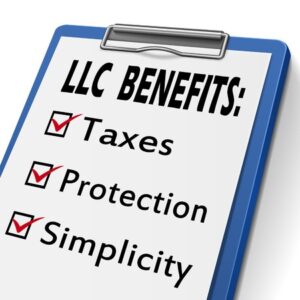
Believe it or not, an LLC, while beneficial in a lot of situations, is not a one size fits all solution to your business forming needs.
So what is an LLC, and how do I form one?
An LLC is a hybrid type of legal entity that provides for limited liability, similar to a corporation, but also allows for flexible tax and management structures. An LLC is formed by choosing a business name (that is available in your state), and then filing Articles of Organization in the state in which you do business. In addition, you are likely to need an operating agreement, especially if you are forming a “multi-member” LLC, which is exactly what it sounds like – a business with more than one owner.
After you have gone through all the corporate formalities, there are some secondary steps you will need to take to form your business properly, which include:
- Obtaining the proper licenses and permits. Every city and state has different requirements, but many require you to obtain some form of business license and/or permit to do business. Here is a handy resource from the Small Business Administration that can help you find the requirements for your particular state.
- Announcing your Business. Although rare, some states require you to take an additional step and publish a statement in your local newspaper letting the public know that you have formed a new LLC. Some of the states that require this include Arizona and New York. This is an added expense that you must consider if you choose to form an LLC in those states.
What taxes must an LLC pay?
One of the main benefits of forming an LLC is that the business itself is not subject to it's own income tax, like a corporation. Instead, an LLC is considered a “flow through” entity for income tax purposes. This means that the income from an LLC flows through to the business owners and is listed on their own personal tax return.
However, the inherent flexibility of the LLC allows it's owners to choose how to be taxed. If you are a single-member LLC, then you can simply report your income (or loss) from the LLC on your personal 1040. Alternatively, you can file a form 8832 with the IRS and elect that your LLC be taxed as an S-Corporation. In that situation, you would need to file an “information return” (Form 1120S) with the IRS in addition to your personal tax return.
Keep in mind that if you choose to elect S-Corporation status, you must do so within the first 2 months and 15 days after the LLC is formed, or after the beginning of the tax year in which the election is to take effect.
LLC's that are run as partnerships can also elect to be taxed that way and will file a partnership tax return (Form 1065), just like a traditional partnership would.
Advantages and Disadvantages of Filing for an LLC
The biggest advantage of filing as an LLC is the limited liability it provides to it's owners. This means that the members of the LLC cannot be sued personally for the business debts or liabilities of the LLC.
Other main advantages of filing as an LLC include less regulatory requirements, as compared to filing as an S or C Corporation. Although we recommend it, you do not need to have an annual meeting of shareholders or keep up corporate books/minutes to maintain your corporate status. Also, the members are free to divide up the profits however they choose, as opposed to dividing them in proportion to their ownership interest (as is required by S-Corporations).
One of the main disadvantages of filing as an LLC is the requirement that the member owner pay self-employment taxes on the net income of the business. In an S-Corporation, the net profits are excluded from self-employment taxes, so long as the shareholders take a reasonable salary. If you are making more than $50,000 per year from your business, this is a significant disadvantage to an LLC.
In addition, there can be substantial extra fees in some states to have an LLC vs. an S-Corporation. In North Carolina, for example, you must pay a $200 fee every year you keep the LLC and file an annual report. There is no such requirement for an S-Corporation.
Should you form an LLC?
The bottom line is that it depends. We have prepared significant resources in this website to help you make this decision, or you can contact our office to schedule a free strategy session with a business attorney that can help you work through your personal situation.

